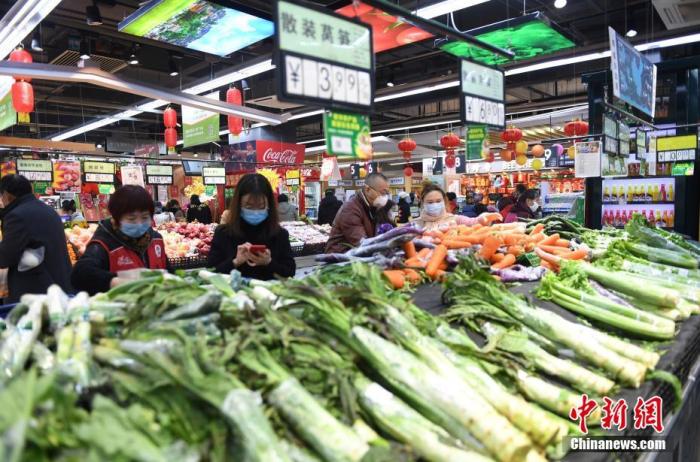China News Service, September 16th. National Development and Reform Commission spokesperson Meng Wei said on the 16th that since the beginning of this year, various regions have issued temporary price subsidies of about 24.63 billion yuan, benefiting about 366 million people in need. The National Development and Reform Commission will guide and urge local governments to follow up. Provisions are made for the timely and full payment of temporary price subsidies, and places where conditions permit are encouraged to continue to implement the phased "standard increase and expansion" policy of temporary price subsidies or issue one-off subsidies to effectively guarantee the basic livelihood of the people in need.
Data map: Citizens buy vegetables.
Photo by China News Agency reporter Li Chenyun
On the 16th, the National Development and Reform Commission held a regular press conference in September.
At the meeting, a reporter asked: Recently we have noticed that vegetable prices have increased in some areas. How do you view the current and future price situation?
"Double Festival" is coming soon. What specific measures will be taken to ensure supply and stabilize prices?
Meng Wei said that from the data in August, vegetable prices rose by 6.4% from the previous month, mainly due to the impact of heavy rainfall, floods and other adverse weather, coupled with the alternation of summer and autumn, and the change of stubble, the supply of some areas was tight in stages, which was pushed to a certain extent. Higher price increases.
However, the growth cycle of vegetables is relatively short. With the reduction of extreme weather in the later period, autumn vegetables will be on the market one after another. The market supply is expected to recover in a relatively short period of time, and the price of fresh vegetables will drop accordingly.
Meng Wei pointed out that at present, the price level is generally within a reasonable range.
The year-on-year increase in CPI has been below 3% for four consecutive months, and the increase in August was the smallest in nearly 17 months.
From a later point of view, the foundation for the stable operation of China's prices is still solid. With the gradual recovery of live pig production and the obvious reduction of tail-raising factors, it is expected that the year-on-year increase in CPI will continue to stabilize.
Meng Wei said that the Mid-Autumn Festival and National Day are approaching. In order to do a good job in market supply during the "two festivals" period and to ensure supply and stable prices, the National Development and Reform Commission will focus on the following tasks.
One is to arrange the deployment early.
The National Development and Reform Commission has issued relevant notices, requiring all localities to strengthen the work of ensuring the supply and stabilizing prices of important livelihood commodities during key periods, further clarifying task requirements and implementing the division of responsibilities.
The second is to strengthen dynamic monitoring.
The National Development and Reform Commission will continue to monitor the production, market and price of finished grains, edible oil, pork, chicken, eggs, vegetables and other commodities. Emergency monitoring will be launched during holidays to keep abreast of market price changes and respond quickly.
The third is the adjustment of organizational reserves.
Before the holiday, the National Development and Reform Commission will increase the amount of central frozen pork reserves in accordance with the market situation to meet consumer demand and ensure that pork prices basically operate smoothly.
The fourth is to hold the bottom line of people's livelihood. Since the beginning of this year, various regions have issued a total of about 24.63 billion yuan of temporary price subsidies, benefiting about 366 million people in difficulties. The National Development and Reform Commission will guide and urge localities to issue temporary price subsidies in full and in time according to regulations, and encourage places where conditions permit to continue to implement temporary price subsidies. A phased "standard increase and expansion" policy or one-off subsidy will be issued to ensure the basic livelihood of the people in need.

